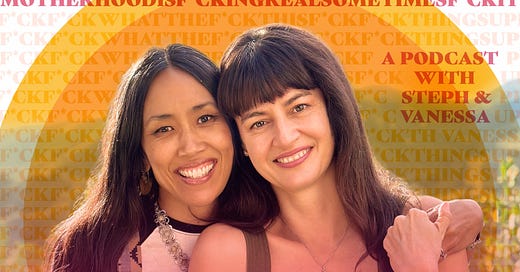Victims of human trafficking are often left in the dark, voiceless, and completely unseen by society. Vanessa and Steph shed light on the topic by sharing the story of a sex trafficking survivor. She has entrusted them with telling her story for the very first time on this podcast. Listen with an open heart and an open mind. For the safety of their guest, she will remain anonymous and this episode is audio only.
Trigger warnings: this episode includes detailed discussion of sexual abuse, self-harm, violence, eating disorders.
Your co-hosts take this topic seriously and continue to research human trafficking. In their findings, they realize human trafficking has many stories and many experiences. It is why the movie The Sound of Freedom is polarizing. Hear what their guest thinks of the movie and why human trafficking needs more awareness.
Get help or report a tip
National Human Trafficking Hotline
Call: 1-888-373-7888, TTY: 711
Text* 233733
Department Defense General Inspector Hotline
1-800-424-9098
“It can happen to anyone,” and “it’s happening in your backyard,” are common in the anti-human trafficking field. Technically, they are true: Anyone can be trafficked, in any community, just as anyone can be the victim of any kind of crime. But the real story is that while it can happen to anyone available evidence suggests that people of color and LGBTQ+ people are more likely to be trafficked than other demographic groups. That’s not a coincidence. Generational trauma, historic oppression, discrimination and other societal factors and inequities create community-wide vulnerabilities. Traffickers recognize and take advantage of people who are vulnerable in certain ways.
Worldwide, experts believe there are more situations of labor trafficking than of sex trafficking, but there is much wider awareness of sex trafficking in the U.S. than of labor trafficking.
11 facts about human trafficking
Researchers estimate that 40 million are enslaved worldwide, generating $150 billion each year in illicit profits for traffickers.
Labor Slavery. About 50 percent (21 million) toil in forced labor slavery in industries where manual labor is needed—such as farming, ranching, logging, mining, fishing, and brick making—and in service industries working as dish washers, janitors, gardeners, and maids.
Sex Slavery. About 12.5 percent (4 million) are trapped in forced prostitution sex slavery.
Forced Marriage Slavery. About 37.5 percent (15 million) are trapped in forced marriages.
Child Slavery. About 25 percent of today’s slaves are children.
MORE RESOURCES
Domestic Violence: National Domestic Violence Hotline, 24 hour Hotline: 1-800-799-SAFE (7233)
Sexual Abuse: Rape, Abuse and Incest National Network (RAINN), 24 hour Hotline: 1-800-656-4673
Dating Violence: National Dating Abuse Helpline, 24 hour Hotline: 1-866-331-9474
Runaway and Homeless Youth: National Runaway Safeline, 24 hour Hotline: 1-800-RUNAWAY (786-2929)
Missing Children and Child Pornography: National Center for Missing and Exploited Children, 24 hour Hotline: 1-800-THE-LOST (843-5678)
--- Support this podcast: https://podcasters.spotify.com/pod/show/realmotherfuckers/support















Share this post